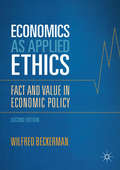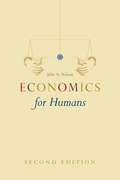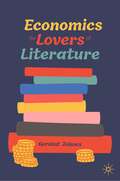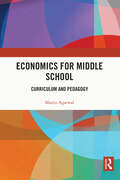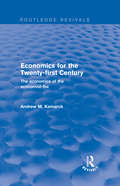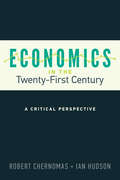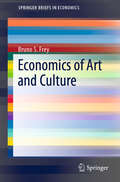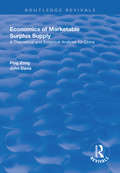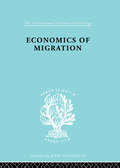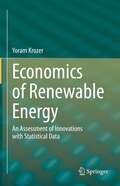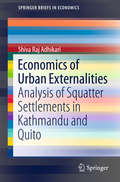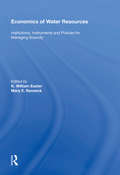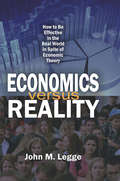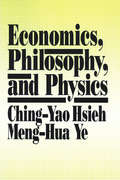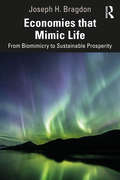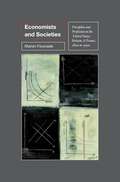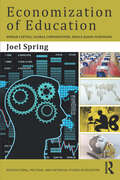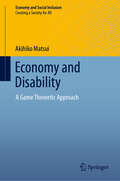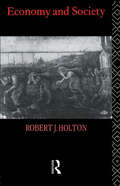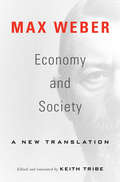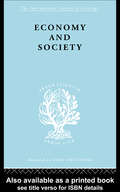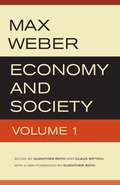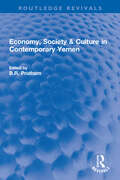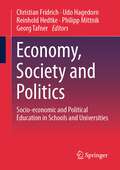- Table View
- List View
Economics as Applied Ethics
by Wilfred BeckermanThe focus of this textbook is on the link between ethics and economic policy analysis. Basic philosophical concepts are systematically described, followed by conventional welfare economic theory and policy, and applications to some topical economic problems such as income distribution and sustainable development.
Economics for Humans
by Julie A. NelsonAt its core, an economy is about providing goods and services for human well-being. But many economists and critics preach that an economy is something far different: a cold and heartless system that operates outside of human control. In this impassioned and perceptive work, Julie A. Nelson asks a compelling question: given that our economic world is something that we as humans create, aren’t ethics and human relationships—dimensions of a full and rich life—intrinsically part of the picture?Economics for Humans argues against the well-ingrained notion that economics is immune to moral values and distant from human relationships. Here, Nelson locates the impediment to a more considerate economic world in an assumption that is shared by both neoliberals and the political left. Despite their seemingly insurmountable differences, both make use of the metaphor, first proposed by Adam Smith, that the economy is a machine. This pervasive idea, Nelson argues, has blinded us to the qualities that make us work and care for one another—qualities that also make businesses thrive and markets grow. We can wed our interest in money with our justifiable concerns about ethics and social well-being. And we can do so if we recognize that an economy is not a machine, but a living thing in need of attention and careful tending. This second edition has been updated and refined throughout, with expanded discussions of many topics and a new chapter that investigates the apparent conflict between economic well-being and ecological sustainability. Further developing the main points of the first edition, Economics for Humans will continue to both invigorate and inspire readers to reshape the way they view the economy, its possibilities, and their place within it.
Economics for Lovers of Literature
by Geraint JohnesThis book provides an engaging introduction to economics through a literary lens. Drawing on writers such as James Joyce, George Eliot, Edith Wharton, Jane Austen, Charlotte Bronte, and Elizabeth Gaskell, each chapter is framed around a quote from a classic text of English literature that helps tease out a key economic concept and demonstrate its broader relevance. While rigorous, the book is virtually free of technical language and aims to give a concise overview of all the main topics in contemporary economics – from supply and demand, pricing, labour markets, externalities, and game theory, to environmental and behavioural economics, fiscal policy and business cycles, modern approaches to macroeconomics and economic growth.Interweaving literary examples with easy-to-follow explanations and reflective tasks, the book takes an interdisciplinary approach to economics and literature that requires no prior knowledge in either camp, but which illuminates patterns of real-world behaviour observed by novelists and economists alike. This concise and accessible book will be a valuable tool for students embarking on introductory economics courses, economics modules in business studies, and interdisciplinary courses more broadly, as well as the general reader interested in building their knowledge of economics.
Economics for Middle School: Curriculum and Pedagogy
by Manju AgarwalThis book discusses the importance of teaching fundamental economic concepts as part of the middle school social science curriculum in India. It examines the status of economics in Indian schools, the issues faced in teaching it at the middle school level, and emphasizes the need for increasing the economic literacy of students. It offers valuable recommendations to curriculum planners and educators to help them bolster economics education in Indian schools. The author presents an extensive curriculum framework with the intention of developing intellectual and social skills in students. The book also features classroom tested lessons, content guidelines, and a comprehensive teaching plan for grades six, seven, and eight. A crucial contribution to the study of school education in India, this book will be of interest to teachers, students, and researchers of education, economics education, and economics. It will also be useful for policy planners, professional economists, administrators, school boards, and research institutions.
Economics for the Twenty-first Century: The Economics of the Economist-fox
by Andrew M. KamarckThis title was first published in 2001. To be effective, economics must take into consideration the complex nature of human beings and the contextual, institutional, social and historical factors at play. This text is designed to help economists to be economic foxes by increasing the range of economists' tools, drawing on the knowledge and experience of other disciplines, to cope better with the extraordinary complexity of the modern economy. The objective is to provide the same kind of revelation in understanding an economy that an artist possesses in the visual arts. A beginner looking at a still life sees a green bottle, a red apple and a yellow cloth on a table top. An artist, however, can point out to him all the nuances of colour. Following a rapid dissection of the canonical hypotheses of contemporary economic theory, different sectors of the real economy are explored: the corporation; corporate governance; services; the public sector; civil society; professions; social capital; national cultures; and the tropics.
Economics in the Twenty-First Century: A Critical Perspective
by Ian Hudson Robert ChernomasEconomics has always been nicknamed the "dismal science," but today the field seems a little more dismal than usual as governments, social movements, and even students complain that the discipline is failing to make sense of the major economic problems of the day.In Economics in the Twenty-First Century, Robert Chernomas and Ian Hudson demonstrate how today's top young economists continue to lead the field in the wrong direction. The recent winners of the John Bates Clark medal, economics's "baby Nobel," have won that award for studying important issues such as economic development, income inequality, crime, and health. Examining their research, Chernomas and Hudson show that this work focuses on individual choice, ignores the systematic role of power in the economic system, and leads to solutions that are of limited effectiveness at best and harmful at worst.An accessible summary of the latest debates in economics, Economics in the Twenty-First Century takes on what is missing from mainstream economics, why it matters, and how the discipline can better address the key concerns of our era.
Economics of Art and Culture (SpringerBriefs in Economics)
by Bruno S. FreyThis book studies the relationship between the arts and the economy. By applying economic thinking to arts and culture, it analyses markets for art and cultural goods, highlights specific facets of art auctions and discusses determinants of the economic success of artists. The author also sheds new light on various cultural areas, such as the performing and visual arts, festivals, films, museums and cultural heritage. Lastly, the book discusses cultural policies, the role of the state in financing culture, and the relationship between the arts and happiness.
Economics of Marketable Surplus Supply: Theoretical and Empirical Analysis for China (Routledge Revivals)
by John Davis Ping ZongPublished in 1998. Chinese farm households have been at the centre of the rural reform process since the introduction of the Household Responsibility System in the late 1970’s. There can be little doubt that, for decades to come, they will continue to be a focus of interest both in academic and political circles. This is particularly true in relation to their role of grain sector, when we consider the prominent position of grain in China’s political economy. There is also intense global interest in the impact of the reform process on the country’s future grain self-sufficiency and trade. This book is ambitious in both its scope and remit. Its primary focus is the behaviour of the marketable surplus element of farm households’ grain supply since the beginning of the reform period. The early chapters provide very valuable insights into the nature of the rural reform process; it then looks at the impact of the reforms on the structure of rural economy in general and farm households in particular. This part of the book is rich in statistics on the reform period. In the analytical section the emphasis is on the difficult area of household modelling, covering both theoretical and empirical aspects. Despite the data limitations, which the authors acknowledge, these chapters provide very valuable analyses of the grain price changes. In particular, their use of models which capture the interdependencies between grain marketable surplus supply is a genuine contribution. This book should be read by anyone with an interest in the rural reform process in China and will be of particular relevance to students, scholars and the policy community.
Economics of Migration (International Library of Sociology)
by Julius IssacFirst published in 1998. Routledge is an imprint of Taylor & Francis, an informa company.
Economics of Renewable Energy: An Assessment of Innovations with Statistical Data
by Yoram KrozerThe book provides a comprehensive review of renewable energy from an economic perspective throughout the last two hundred years, starting from traditional renewable energy based on bio and hydro energy. The focus is on modern renewable energy based on geothermal, wind, and solar energy. It emerged when innovative entrepreneurs captured opportunities for valuable energy services. As the services with renewable energy expanded, the costs of technologies decreased entailing global commercialisation. This enables larger access to energy and emission reduction of carbon dioxide, but also causes larger differences in the energy resources across countries which impedes international policies. That optimistic viewpoint on the shift to the global low-carbon economy is largely based on statistical data about purchasing power, energy consumption and businesses, and valuable energy services in many countries on all continents. The data are presented in 70 tables, graphs, and figures, most of them original. Interpretation of the data are useful in support of decisions making about sustainable development in civil society, businesses, and policy makers as well as for the verifications of scholarly hypotheses and projections in energy and climate policies.
Economics of Urban Externalities
by Shiva Raj AdhikariThisbook provides a fresh look at measuring negative externalities in theurbanization process. Meeting the challenges that come hand-in-hand with thecontemporary age of rapid urbanization demands more extensive empiricalknowledge. While most urbanization research focuses on positive externalities,this book is designed to offer insights into possible sources of negativeexternalities and the measurement thereof. In economics, the measurement ofexternalities is a challenging task that demands innovative research designs;however, previous research has failed to capture all of these externalities. The technique described in this book is carefully designed to measure negativeexternalities, particularly those related to squatter settlements that havebeen hitherto largely ignored by urbanization literature. The existence ofnegative externalities and the unintended consequences of rapid urbanization,particularly those related to squatter settlements, can be found in LatinAmerica and Asia. This book provides comparative insights based on extensiveprimary surveys of households in squatter and non-squatter settlements ofKathmandu, Nepal and Quito, Ecuador. It is considered a case study that willimprove the understanding of urbanization issues between Latin America andAsia. Societal benefits can be improved through the reduction of negativeexternalities. This book helps policy makers in Kathmandu and Quito fine-tunetheir policies to address the source of urban externality, as well as providenew insights into the nexus between urbanization and development. An investmentin the reduction of negative externalities is profitable, thus presenting thegovernment and international partners with a great opportunity. This bookcontributes to existing literature and will be useful for researchers andstudents.
Economics of Water Resources: Institutions, Instruments and Policies for Managing Scarcity (The\international Library Of Environmental Economics And Policy Ser.)
by Mary E. RenwickWater is becoming an increasingly scarce commodity in many parts of the world. Population growth plus a growing appetite for larger quantities of cheap water quality as a result of urban, industrial, and agricultural pollution coupled with increasing environmental demands have further reduced usable suppliers. This book brings together thirty of the best economic articles addressing water scarcity issues within the US and Mexico. By touching on a number of different issues, this volume clearly articulates the need for improving existing institutional arrangements as well as for developing new arrangements to address growing water scarcity problems.
Economics of the Family
by Martin Browning Pierre-André Chiappori Yoram WeissThe family is a complex decision unit in which partners with potentially different objectives make consumption, work and fertility decisions. Couples marry and divorce partly based on their ability to coordinate these activities, which in turn depends on how well they are matched. This book provides a comprehensive, modern and self-contained account of the research in the growing area of family economics. The first half of the book develops several alternative models of family decision making. Particular attention is paid to the collective model and its testable implications. The second half discusses household formation and dissolution and who marries whom. Matching models with and without frictions are analyzed and the important role of within-family transfers is explained. The implications for marriage, divorce and fertility are discussed. The book is intended for graduate students in economics and for researchers in other fields interested in the economic approach to the family.
Economics versus Reality: How to be Effective in the Real World in Spite of Economic Theory
by John M LeggeJohn M. Legge shows the many ways in which the real world diverges from economics textbooks. He argues that mainstream economic theory took a disastrous turn 140 years ago, when it attempted to use calculus to explain human behaviour. A real economy involves people who are not variables in equations. This error led to a second, mainstream economics becoming obsessed with equilibrium. However, constant change is the reality and one cannot explain the present without understanding the path taken to get here. This book presents economics in historical context. It includes a short account of the contributions by some of the key figures in economic theory, starting with Adam Smith. Smith placed great weight on morality: he believed that economic activity took place in a society and could not be justified except insofar as it advanced the interests of that society. Too many economists have come to believe that the interests of society can be measured by a number: that if a policy change raises GDP it is justified, whatever its impact on people.Legge places the economy within society, and society within the environment, explaining that every significant decision has a social and environmental impact, as well as an economic dimension. Seeking to provide answers to students, professional business managers, and those interested in the political process, this work addresses the gap between theory and reality.
Economics, Philosophy and Physics
by Ching-Yao Hsieh Meng-Hua YeThis book traces the relationship between ideas and methodological perspectives in economics to the fields of philosophy and the physical sciences. It is aimed at students of economics who want to learn about the philosophical underpinnings and scientific foundations of contemporary economic theory. The authors show how advances in scientific knowledge have had an impact on philosophy that in turn influenced the development of economic thought.
Economies that Mimic Life: From Biomimicry to Sustainable Prosperity
by Joseph H. BragdonThe world economy today is at an historical inflection point. The neoclassical (industrial) model of economics is self-destructing while a new life-mimicking model, based on radically different assumptions, is emerging. Although rarely acknowledged in economic journals, Nordic countries, which pioneered the life-mimicking model, have become world leaders in prosperity and productivity while those operating on the older neoclassical/industrial model are trapped in downward spirals. By approaching economies as sub-systems of life rather than super-systems that transcend life, we gain transformative insights. Such thinking led to the first circular economy experiments in Kalundborg (Denmark) during the 1970s, then quickly spread to the rest of the Nordic world. By placing a higher value on living assets (people and Nature) than on non-living capital assets, this approach generates harmony rather than exploitation and conflict. Because Nordic people feel vested in the system and responsible for its success, they are extraordinarily innovative and productive. That is why Nordic companies are regularly rated among the world’s most sustainable and profitable in their fields – even though their region holds less than half of one percent of the world’s population. Written in an accessible way for non-economists, the book is ideal for readers interested in the benefits of biomimicry and methods of guiding democratic countries along a proven path of self-renewal. Economies That Mimic Life will also provide useful background for corporate leaders in scenario planning and strategic thinking. Knowing which way the political-economic wind is blowing will become increasingly important to corporate survival.
Economists and Societies: Discipline and Profession in the United States, Britain, and France, 1890s to 1990s (Princeton Studies in Cultural Sociology #38)
by Marion FourcadeEconomists and Societies is the first book to systematically compare the profession of economics in the United States, Britain, and France, and to explain why economics, far from being a uniform science, differs in important ways among these three countries. Drawing on in-depth interviews with economists, institutional analysis, and a wealth of scholarly evidence, Marion Fourcade traces the history of economics in each country from the late nineteenth century to the present, demonstrating how each political, cultural, and institutional context gave rise to a distinct professional and disciplinary configuration. She argues that because the substance of political life varied from country to country, people's experience and understanding of the economy, and their political and intellectual battles over it, crystallized in different ways--through scientific and mercantile professionalism in the United States, public-minded elitism in Britain, and statist divisions in France. Fourcade moves past old debates about the relationship between culture and institutions in the production of expert knowledge to show that scientific and practical claims over the economy in these three societies arose from different elites with different intellectual orientations, institutional entanglements, and social purposes. Much more than a history of the economics profession, Economists and Societies is a revealing exploration of American, French, and British society and culture as seen through the lens of their respective economic institutions and the distinctive character of their economic experts.
Economization of Education: Human Capital, Global Corporations, Skills-Based Schooling (Sociocultural, Political, and Historical Studies in Education)
by Joel SpringIn this timely, cogent analysis of trends and powerful forces shaping global educational policy today, Joel Spring focuses on how economization is making economic growth and increased productivity the main goals of schools, and the ways these goals are achieved—including measuring educational policies by their costs and economic benefits, shaping family life to ensure productive workers and high-achieving students, introducing entrepreneurship education into curricula from preschool through higher education, and increasing the involvement of economists in educational policy analysis. Close attention is given to the Organization for Economic Cooperation and Development (OECD), the World Bank, the World Economic Forum, and multinational corporations, which, as advocates of economization, want schools to focus on teaching hard and soft skills needed by the global labor market. Economization raises questions about the effects of economically driven agendas for schools: Will education policies advocated by global organizations and multinational businesses corporatize and standardize human personalities and families? What type of global worker is being sought by global organizations and multinational corporations? What education programs are supported to educate the ideal global worker? What is the ideal family life for economic growth and development? Detailing and analyzing the politics and motivations driving economization, the book concludes with an assessment of the impacts of the confluence of business interests, economic theories, governments, and educators.
Economy and Disability: A Game Theoretic Approach (Economy and Social Inclusion)
by Akihiko MatsuiSociety has developed so that it accommodates the needs of intertwined people, but a question arises as to which people have been accommodated. Has everyone been taken care of in an equal manner? If not, who has fallen into the gap between the institutions that are supposed to accommodate them? This book is a study of these issues of economy and disability using game theory, which has provided a means of analyzing various social phenomena. Part I provides actual cases related to economy and disability, with the stories based on interviews by the author. Part II is geared toward a game theoretic analysis. This book explains disability-related issues by game theory and innovates that theory by deeply contemplating the issues.It is not common that first-rate theorists manage to make their research relevant and applicable to the most pressing problems our society faces these days. This is the remarkable achievement of this book. Akihiko Matsui, an internationally recognized leader in economic theory, succeeds in bringing profound game theoretical insights to the questions of disability, the social norms relating to it, and the ethical and economic problems they raise. The book is a tour de force, brilliantly combining economic and sociology, mathematics and philosophy, to provide us a fresh look at the way we run modern societies.Itzahk Gilboa, Professor, Eitan Berglas School of Economics, Tel-Aviv University and Professor of Economics and Decision Sciences, HEC, ParisThe present world faces a broad range of societal problems such as discrimination against minorities and conflicts between groups. The market mechanism may solve some of these dilemmas, but many others remain. This book targets various societal problems and provides game theoretical approaches to them, stressing the importance of social institutions including the market system and individual interactive attitudes to society. Aki Matsui’s splendid Economy and Disability is indispensable for students and scholars interested in social science, particularly in economic theory, and gives a better understanding of these phenomena and their potential cures.Mamoru Kaneko, Professor, Faculty of Political Science and Economics, Waseda UniversityIn this book, Aki Matsui is revealed to be a fully-fledged humanist in the guise of a game theoretician. He beautifully presents game-theoretical ideas while at the same time suggesting how society should relate to the disabled. This unique combination makes Economy and Disability—apart from anything else—a truly moving book.Ariel Rubinstein, Professor of Economics, Eitan Berglas School of Economics, Tel-Aviv University and Professor of Economics, New York University
Economy and Society (Routledge Library Editions: Social Theory Ser.)
by Robert J. HoltonEconomy and Society is a major landmark in the recent emergence of economic sociology. Robert J. Holton provides a major new synthesis of social scientific thinking on the inter-relationship between economy and society arguing for the importance of politics and culture to the functioning of the economy and drawing on the strengths but avoiding the weaknesses of economic liberalism and political economy.
Economy and Society: A New Translation (People, Markets, Goods: Economies And Societies In History Ser. #Volume 10)
by Max WeberKeith Tribe’s new translation presents Economy and Society as it stood when Max Weber died. One of the world’s leading experts on Weber’s thought, Tribe has produced a clear and faithful translation that will become the definitive English edition of one of the few indisputably great intellectual works of the past 150 years.
Economy and Society: A Study in the Integration of Economic and Social Theory (International Library of Sociology)
by Neil Smelser Talcot ParsonsThis volume is designed as a contribution to the synthesis of theory ineconomics and sociology. We believe that the degree of separationbetween these two disciplines separation emphasized by intellectualtraditions and present institutional arrangements arbitrarily concealsa degree of intrinsic intimacy between them which must be brought tothe attention of the respective professional groups.
Economy and Society: An Outline of Interpretive Sociology
by Max Weber Guenther Roth Claus WittichPublished posthumously in the early 1920's, Max Weber's Economy and Society has since become recognized as one of the greatest sociological treatises of the 20th century, as well as a foundational text of the modern sociological imagination. The first strictly empirical comparison of social structures and normative orders conducted in world-historical depth, this two volume set of Economy and Society--now with new introductory material contextualizing Weber’s work for 21st century audiences--looks at social action, religion, law, bureaucracy, charisma, the city, and the political community. Meant as a broad introduction for an educated general public, in its own way Economy and Society is the most demanding textbook yet written by a sociologist. The precision of its definitions, the complexity of its typologies, and the wealth of its historical content make the work an important challenge to our sociological thought: for the advanced undergraduate who gropes for her sense of society, for the graduate student who must develop his own analytical skills, and for the scholar who must match wits with Weber.
Economy, Society & Culture in Contemporary Yemen (Routledge Revivals)
by B. R. PridhamFirst published in 1985, Economy, Society & Culture in Contemporary Yemen was written to present a wealth of research and thinking that was new to the field at the time of original publication. The book covers a wide range of topics, including socio-economic development, agriculture, land use, fiscal policies, emigration, health, education, and politics. In doing so, it provides a close analysis of the situation in Yemen in the 1980s whilst exploring recent developments of the preceding years. It will appeal to those with an interest in the history of Yemen.
Economy, Society and Politics: Socio-economic and Political Education in Schools and Universities
by Christian Fridrich Reinhold Hedtke Georg Tafner Udo Hagedorn Philipp MittnikThe interconnections of economy, society and politics so obviously determine socio-economic and political structures and problem situations, current ways of thinking and acting as well as the collective perception of solution options that their still low attention in university teaching and school education is surprising. Phenomena such as pandemics, climate change, migration or authoritarianism make the close, complex and contradictory connections between economy, society and politics tangible. Against this background, socioeconomic research, teaching and education are urgently needed. The theme volume aims to contribute to this by presenting research contributions on problem complexes such as economy and democracy, perspectivity and multiperspectivity, situation, interest and politics, subject and subjectification, and discipline and curriculum.
